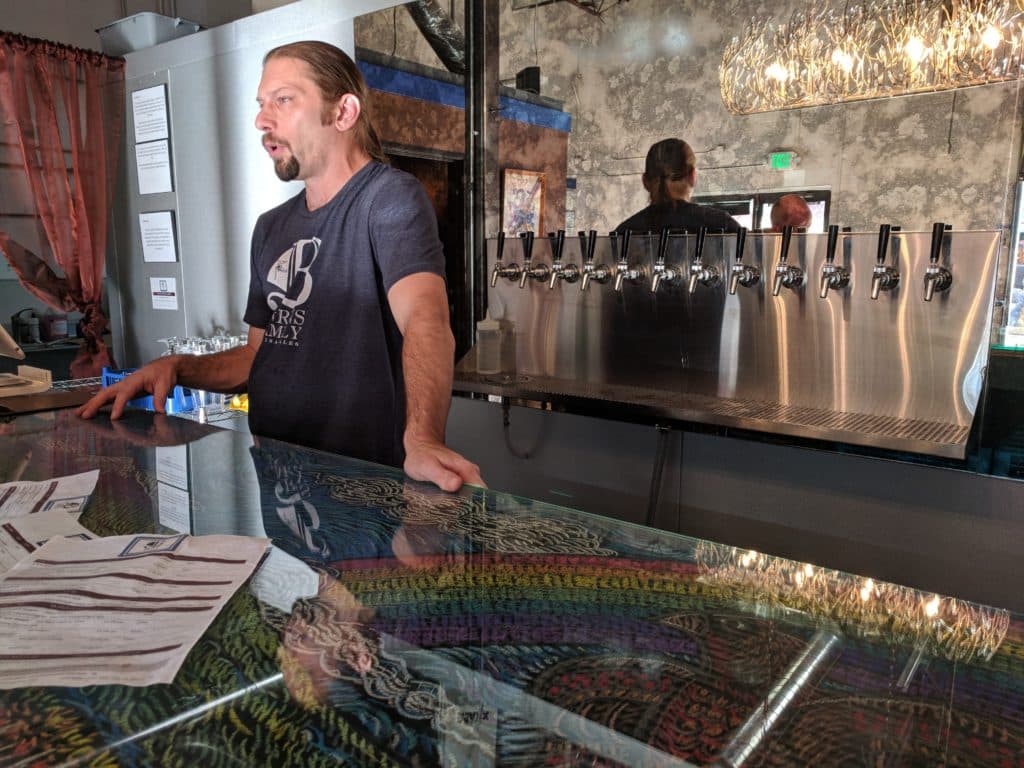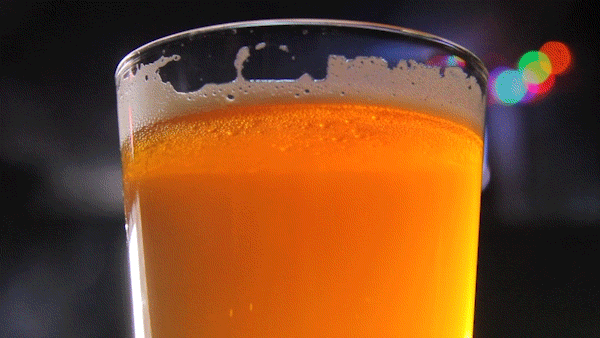Denver’s craft brewing scene has changed tremendously since Darren Boyd and two fellow industry pros signed a lease four years ago to open Spangalang Brewing in a hollowed-out former DMV office in Denver’s historic Five Points neighborhood.
The number of breweries in the city limits has exploded, with one, Woods Boss Brewing, opening just a few blocks away. Bars that offer dozens of craft beer handles have proliferated. Trends are all the rage, from hazy New England-style IPAs to milkshake IPAs brewed with lactose, stouts that taste like German chocolate cake, even glitter beer.
All the while, Spangalang has stuck to its identity as a neighborhood brewery producing a strong and deep lineup of beers, with only the occasional foray into the trendy. Boyd expresses optimism about his brewery’s growth — and some fear for the future of Denver’s beer scene.
“From brewery to brewery it’s so different, so it’s hard to make sweeping generalizations about the industry,” said Boyd, who studied economics in college. “I honestly can’t believe people are still opening breweries in Denver. At the same time, there are breweries out there making subpar beer. And if someone opens up who makes better beer, they may very well be the ones that survive. That is better for the industry and the city if that happens.”
As the nation’s craft brewing industry converges on Denver this week for the Great American Beer Festival, there is plenty to celebrate about a scene that continues to grow, mature and crank out amazing beers. But Boyd is not alone in expressing concerns about quality and sustainability in what in short order has become an extremely crowded Denver market.
Just eight years ago, you could count the number of Denver breweries on two hands.
Now there are 78 active breweries with a Denver address, according to the industry trade group the Brewers Association, which stages GABF. (That figure includes breweries with more than one location). Denver is right behind Portland in terms of breweries per capita, the association says.
While breweries continue to open in Denver at a rapid clip, the past year has also seen the closings of Beryl’s Beer Company, Deep Draft Brewing and Zephyr Brewing, all for their own distinct reasons. (Beryl’s beer had a strong reputation; Zephyr’s was widely panned).
Other breweries report flat sales. Still others are flourishing financially thanks to well-made beer, enviable locations or cool taprooms — though not necessarily all three.
“There are a lot of breweries, and not all of them are making the best beer out there,” said Nick Nunns, who founded TRVE Brewing in the Baker neighborhood in 2012. “Some of them are doing really great and getting no recognition, and some are doing very poorly and getting a lot of recognition. And it sometimes seems there is no rhyme or reason for it.”
TRVE, which blares heavy metal at its Broadway taproom, has developed a devoted following for its mixed culture beers that are dry and low in alcohol, offering a balanced profile and subtle complexity. Still, “the taproom is a little less busy than it used to be,” Nunns said. TRVE has other things working in its favor, including a growing distribution arm.
Our Mutual Friend opened in December 2012 in Denver’s then-still rising River North district, aiming to be a meeting place with a diverse crowd drinking a range of beers.
The brewery started operating on on a tiny homebrew setup with plastic fermenters, and sought to brew with all-Colorado ingredients. Co-owner Brandon Proff is blunt about the early going.
“We were brewing the worst beer in town,” he said. “A good way to put it is, back in the beginning, we rejoiced when a beer turned out OK.”
But OMF more than rebounded. After investing in better equipment, promoting a new head brewer and giving up on exclusively sourcing its beer ingredients locally, Our Mutual Friend has won beer competition medals and the respect of its peers in Denver and beyond.
“I think we were lucky that no one was around,” Proff said of the early days. “If we opened a brewery that was like that now, we’d have this big, insane volume of people having a bad experience. Two people would come in on nights I was bartending.”

It's tougher now. Newcomers have had to be good from the get-go, and it helps to be a bit removed from existing breweries.
By 2015, when Ratio Beerworks opened a block north of Our Mutual Friend on Larimer Street, Denver was experiencing a crush of brewery openings. So the notion of being competitive “was almost built into our DNA in year one,” said head brewer and co-founder Jason zumBrunnen.
“Great beer was our basis for entry,” he said. “But you better worry about your story, your branding, your connection to the community, your location — beyond the great beer.”
Ratio’s founders came out of the music business, and their story is about a DIY ethos, celebrating doers and makers, and beer as a community connecting point. Ratio is aiming to grow “slowly and assuredly,” with plans to can beer once the brewery has built up its name and identity, zumBrunnen said. As for being in River North — which has one of the thickest concentration of breweries in the country — zumBrunnen said it’s been a “net slight positive.”
Sure, there’s competition. Just across the street are Finn’s Manor, a bar with a killer tap list, and a new taproom from Odell, a Fort Collins craft brewing institution. But all the development has made the area more walkable and enjoyable, bringing more people in, zumBrunnen said.
Comrade Brewing’s digs in a shopping center on East Iliff Avenue are neither hip nor convenient to most Denver craft beer drinkers. But the brewery’s out-of-the-way location has its benefits. There’s no real competition nearby, and cheaper rent means lower fixed costs, said co-owner David Lin. Sales were up double-digits last year and are again this year, he said.
The brewery hasn’t sat still, either. Lin originally envisioned sales being evenly distributed across styles. But as most followers of craft beer know, IPA is king, Comrade’s Superpower IPA is a sales juggernaut, and the brewery regularly brews other well-executed hoppy beers.
Opinions vary about whether Denver has reached a saturation point in breweries, but most in the industry feel there is room for more, especially in underserved parts of the city. Small breweries are in many ways the new neighborhood bar, and there are brewery-bare spots on the map. At the same time, there is widespread belief that we haven’t seen the last closure.
“I think we’ll continue to see breweries go out of business in the next, call it 18 months,” said Todd Luther of Station 26 Brewing, which is reporting strong wholesale growth from canning its core beers. “Then I think you’ll kind of see the cream rising to the top.”
Married couple Wayne Burns and Laura Worley are betting that Burns Family Artisan Ales will be able to flourish in an off-the-beaten-path location that, they will be the first to admit, has its challenges.
In fact, they are subleasing space from the owner of a brewery that couldn’t make a go of it at 2505 W 2nd Ave. Wit’s End Brewing ceased its own brewing operations last year, but kept its beer and brand alive through an unusual partnership with Strange Brewing.
Burns is known for brewing big beers, earning him the nickname “High-Octane Wayne.” A professional brewer for 25 years, Burns has tended kettles at Bell’s Brewing and Kuhnhenn Brewing in Michigan and at Jagged Mountain Craft Brewery in Denver and Holidaily Brewing in Golden. He has a Great American Beer Festival gold medal to his name — from 1999.
Worley is blunt: She thinks Denver beer drinkers should have shown “a little bit more anticipation” for Burns Family Artisan Ales opening last month, given that pedigree. Taproom traffic has been slow but growing, and an arrangement with a beer tour company has helped.
While the beer list has lower-alcohol offerings like a lemon beer that comes with a cookie, the brewery’s calling card is to go big — like barrel-aged imperial stouts and a braggot-style honey beer that clocks in 16.5 percent alcohol by volume. The goal, Worley said, is to brew beer that tastes great right off the tap and after 20 years in a bottle. No one else in Denver can offer that.
“Yes, I agree perhaps the Denver market is oversaturated with folks opening breweries that have a somewhat generic tap list and are not skilled professionals,” Worley said. “We don’t have room for novices in the market. And I don’t think Denver has learned that lesson yet.”
“Niche breweries or niche anything, if you find one, you have the possibility to find a home,” she said. “What we are specializing in does not have a home. I think we’re offering something unique.”











